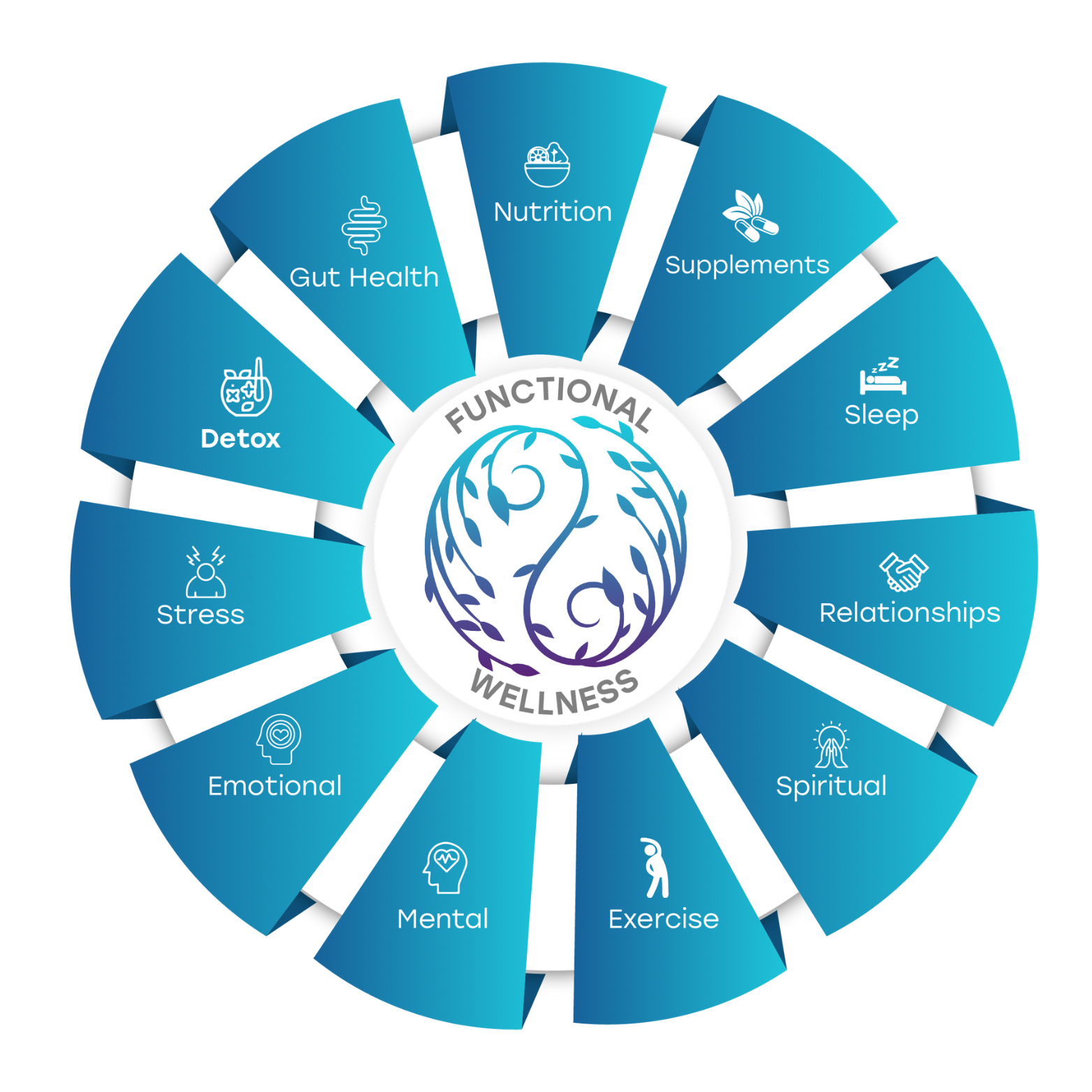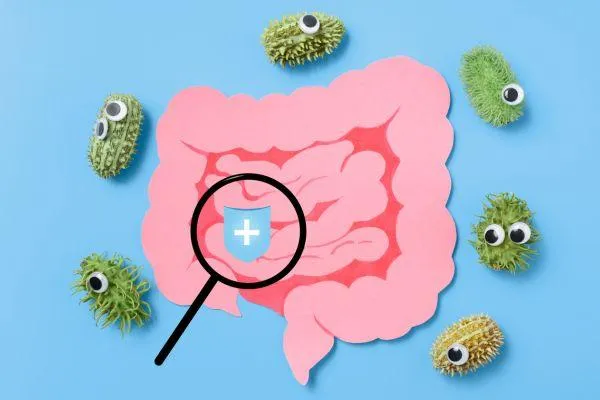Unlock Your
Healthiest Self
Getting to the root cause so you can STOP worrying about your health and START living your best life!
Unlock Your
Healthiest Self
Getting to the root cause so you can STOP worrying about your health and START living your best life!
Evidence Based
Results-Driven
Holistic Care
Get Ready to Take Control Of Your Health
Conditions we commonly treat:
Weight Management and Metabolic Disorders
Hormonal Imbalances
Chronic Pain Conditions
Gut Health - Candida, SIBO, IBS
Allergies and Sensitivities
Digestive Disorders
...and so many more.
Together, let's make lasting changes that
will transform your well-being and your life!
The promise of functional wellness, a holistic approach that goes beyond merely treating symptoms to address the root causes of health issues.


"As a board certified, Johns Hopkins Bayview trained physician, I made a profound shift in my medical focus to Functional Medicine. Embracing this transformation has been incredibly satisfying, allowing me to provide holistic and personalized care to my patients. By integrating the principles of Functional Medicine, I strive to address the root causes of health issues and empower individuals to achieve optimal well-being, ultimately reshaping the way healthcare is approached and experienced."
-Dr. Tanesha
Why Choose BodyViva?
We use a proven three-step process designed to revitalize your body and mind,
guiding you towards optimal wellness through the principles of functional medicine.



You're More Than a Patient
Our clinic offers tailored treatment plans that address the unique needs and root causes of your health concerns, ensuring a truly personalized approach to wellness.

Holistic and Non-Invasive
We take a holistic approach to healthcare, integrating functional medicine principles with advanced diagnostics and evidence-based treatments.

Empowering You
Beyond treatment, we provide education to our patients, equipping them with the knowledge and tools they need to take control of their health journey and make informed decisions for lasting vitality.
The VivaThrive Wellness Protocol

1. Assess & Align
In this initial phase, we delve deep into understanding your unique health profile. Through comprehensive assessments and diagnostics, we uncover the root causes of any imbalances within your body systems. Our goal is to align your body's functions harmoniously, laying the groundwork for holistic healing.

2. Restore & Replenish
Once we identify areas of imbalance, we embark on a journey of restoration and replenishment. Through personalized nutrition plans, targeted supplementation, and lifestyle adjustments, we nourish your body with the vital nutrients it needs to thrive. This phase focuses on replenishing deficiencies, detoxifying, and supporting your body's natural healing mechanisms.

3. Sustain & Thrive
In the final phase of the VivaThrive protocol, we empower you with the knowledge and tools to sustain your newfound vitality long-term. Through ongoing support, education, and personalized wellness strategies, we guide you towards a lifestyle that promotes lasting health and vitality. Our aim is help you thrive, embracing the full potential of your body and mind with vitality and vigor.
Our Educational Resources

Don’t Be Sidelined By SIBO: The Facts On Small Intestinal Bacterial Overgrowth - Copy
Small intestinal bacterial overgrowth (SIBO) is an undiagnosed condition caused by an excess of bacteria in the small intestine. The results of this bacteria overgrowth can be profound and lead to intestinal damage and nutritional deficiency. However, despite the far-reaching implications, many conventional practitioners miss the signs of SIBO. This is partly because the medical profession’s knowledge of the causes and treatment of SIBO is relatively new.
What Is Small Intestine Bacterial Overgrowth?
Bacteria play an important role in your large intestine, where they break down carbohydrates and help absorb nutrients. These processes produce a lot of gas, but the large intestine is designed to (mostly) accommodate gas production.
However, issues arise when gas-producing bacteria enter the small intestine, leading to bloating, diarrhea, and constipation – and sometimes, all three!
Generally speaking, there are three kinds of SIBO.
SIBO-D happens when bacteria produce hydrogen, leading to bloating and diarrhea.
SIBO-C is triggered by methane gas that slows down the transit time of waste products, leading to constipation.
Researchers are learning more about a third kind of SIBO, linked to excess levels of hydrogen sulfide, a gas you might recognize for its “rotten eggs” smell.
Many people experience a mix of the above, including alternating diarrhea and constipation.
Other symptoms of SIBO include:
Excessive burping
Acid reflux after meals
Bad-smelling gas
Gurgling noises in your stomach
Cramping and other discomforts
SIBO can also trigger seemingly unrelated symptoms such as joint pain, mood issues, food sensitivities, memory problems, and weight gain.
The impact of SIBO on your health
The symptoms of SIBO aren’t just annoying and uncomfortable – they can also impact your overall well-being. Bacteria in the small intestine can damage the intestinal walls and interfere with nutrient absorption. People with CIBO-D are at risk of low levels of essential nutrients like vitamin B12 and iron. And CIBO-C is often associated with weight gain.
What Causes SIBO?
Digestion is a complex process, and when something goes wrong, the effects can multiply in unexpected ways. SIBO is often the result of multiple factors and it’s not always possible to pinpoint a specific trigger.
Many medical conditions create the conditions that lead to bacterial overgrowth in the small intestine, including:
Irritable bowel syndrome – by some estimates, almost 80% of people with IBS also have SIBO
Lyme Disease
Diabetes
Hypothyroidism
Scleroderma
One of the most common triggers for SIBO is bacterial gastroenteritis, more commonly referred to as food poisoning. Your body’s response to food poisoning can slow digestive motility, and in effect the movement of bacteria.
Stress is also a common contributor to SIBO, in part because stress can also affect motility and trigger digestive upset.
Diagnosing SIBO
Despite its complex possible causes, SIBO can be surprisingly easy to diagnose. The preferred diagnostic tool is a breath test that measures the hydrogen and methane gas in your breath. After following a specific diet or fasting for a day or two beforehand, you’ll drink a mix of glucose and water at regular intervals, breathing into tubes that measure gas levels after every drink.
Blood and stool tests to measure nutritional deficiencies and digestive function are sometimes also needed.
Treating SIBO
The best treatment for SIBO follows a three-pronged model designed to get to the root of the bacteria overgrowth and stop further growth. Be wary of any simple solution that merely masks the symptoms. Instead, focus on these steps.
1 - Start healing by reducing the symptoms through diet
To ease your symptoms and slow the continuing growth of bacteria, you want to eliminate the foods bacteria feed on: starches, sugars, and soluble fiber. Lean sources of protein and healthy fats can give your digestive tract a break. However, the best diet for SIBO patients can vary widely and depends on other factors such as food sensitivities and caloric needs, so it’s important to work with a healthcare practitioner.
2 - Reduce bacteria content in the small intestine
Again, this can vary a great deal by individual. Herbal antimicrobials can naturally reduce the bacteria without the side effects of antibiotics. Oil of oregano, berberine, and red thyme all have antimicrobial properties, but the exact treatment should be determined in consultation with a healthcare provider.
3 - Restore good bacteria
Our bodies require a certain amount of beneficial bacteria, so it’s important to repopulate! For many patients, this can be accomplished with probiotic supplements and a diet with plenty of fermented foods like sauerkraut and yogurt
.
The symptoms of SIBO can be debilitating, but you don’t have to suffer. Because treatment is typically highly individual, it’s important to work closely with a healthcare practitioner. If you recognize the symptoms of SIBO and want to get started with treating it, don’t hesitate to call.
Sources:
Ghoshal UC, Shukla R, Ghoshal U. Small Intestinal Bacterial Overgrowth and Irritable Bowel Syndrome: A Bridge between Functional Organic Dichotomy. Gut Liver. 2017 Mar 15;11(2):196-208. doi: 10.5009/gnl16126. PMID: 28274108; PMCID: PMC5347643.
Wang SX, Wu WC. Effects of psychological stress on small intestinal motility and bacteria and mucosa in mice. World J Gastroenterol. 2005 Apr 7;11(13):2016-21. doi: 10.3748/wjg.v11.i13.2016. PMID: 15800998; PMCID: PMC4305729.
Chedid V, Dhalla S, Clarke JO, Roland BC, Dunbar KB, Koh J, Justino E, Tomakin E, Mullin GE. Herbal therapy is equivalent to rifaximin for the treatment of small intestinal bacterial overgrowth. Glob Adv Health Med. 2014 May;3(3):16-24. doi: 10.7453/gahmj.2014.019. PMID: 24891990; PMCID: PMC4030608.
Soifer LO, Peralta D, Dima G, Besasso H. Comparative clinical efficacy of a probiotic vs. an antibiotic in the treatment of patients with intestinal bacterial overgrowth and chronic abdominal functional distension: a pilot study. Acta Gastroenterol Latinoam. 2010 Dec;40(4):323-7. Spanish. PMID: 21381407.

Don’t Be Sidelined By SIBO: The Facts On Small Intestinal Bacterial Overgrowth - Copy
Small intestinal bacterial overgrowth (SIBO) is an undiagnosed condition caused by an excess of bacteria in the small intestine. The results of this bacteria overgrowth can be profound and lead to intestinal damage and nutritional deficiency. However, despite the far-reaching implications, many conventional practitioners miss the signs of SIBO. This is partly because the medical profession’s knowledge of the causes and treatment of SIBO is relatively new.
What Is Small Intestine Bacterial Overgrowth?
Bacteria play an important role in your large intestine, where they break down carbohydrates and help absorb nutrients. These processes produce a lot of gas, but the large intestine is designed to (mostly) accommodate gas production.
However, issues arise when gas-producing bacteria enter the small intestine, leading to bloating, diarrhea, and constipation – and sometimes, all three!
Generally speaking, there are three kinds of SIBO.
SIBO-D happens when bacteria produce hydrogen, leading to bloating and diarrhea.
SIBO-C is triggered by methane gas that slows down the transit time of waste products, leading to constipation.
Researchers are learning more about a third kind of SIBO, linked to excess levels of hydrogen sulfide, a gas you might recognize for its “rotten eggs” smell.
Many people experience a mix of the above, including alternating diarrhea and constipation.
Other symptoms of SIBO include:
Excessive burping
Acid reflux after meals
Bad-smelling gas
Gurgling noises in your stomach
Cramping and other discomforts
SIBO can also trigger seemingly unrelated symptoms such as joint pain, mood issues, food sensitivities, memory problems, and weight gain.
The impact of SIBO on your health
The symptoms of SIBO aren’t just annoying and uncomfortable – they can also impact your overall well-being. Bacteria in the small intestine can damage the intestinal walls and interfere with nutrient absorption. People with CIBO-D are at risk of low levels of essential nutrients like vitamin B12 and iron. And CIBO-C is often associated with weight gain.
What Causes SIBO?
Digestion is a complex process, and when something goes wrong, the effects can multiply in unexpected ways. SIBO is often the result of multiple factors and it’s not always possible to pinpoint a specific trigger.
Many medical conditions create the conditions that lead to bacterial overgrowth in the small intestine, including:
Irritable bowel syndrome – by some estimates, almost 80% of people with IBS also have SIBO
Lyme Disease
Diabetes
Hypothyroidism
Scleroderma
One of the most common triggers for SIBO is bacterial gastroenteritis, more commonly referred to as food poisoning. Your body’s response to food poisoning can slow digestive motility, and in effect the movement of bacteria.
Stress is also a common contributor to SIBO, in part because stress can also affect motility and trigger digestive upset.
Diagnosing SIBO
Despite its complex possible causes, SIBO can be surprisingly easy to diagnose. The preferred diagnostic tool is a breath test that measures the hydrogen and methane gas in your breath. After following a specific diet or fasting for a day or two beforehand, you’ll drink a mix of glucose and water at regular intervals, breathing into tubes that measure gas levels after every drink.
Blood and stool tests to measure nutritional deficiencies and digestive function are sometimes also needed.
Treating SIBO
The best treatment for SIBO follows a three-pronged model designed to get to the root of the bacteria overgrowth and stop further growth. Be wary of any simple solution that merely masks the symptoms. Instead, focus on these steps.
1 - Start healing by reducing the symptoms through diet
To ease your symptoms and slow the continuing growth of bacteria, you want to eliminate the foods bacteria feed on: starches, sugars, and soluble fiber. Lean sources of protein and healthy fats can give your digestive tract a break. However, the best diet for SIBO patients can vary widely and depends on other factors such as food sensitivities and caloric needs, so it’s important to work with a healthcare practitioner.
2 - Reduce bacteria content in the small intestine
Again, this can vary a great deal by individual. Herbal antimicrobials can naturally reduce the bacteria without the side effects of antibiotics. Oil of oregano, berberine, and red thyme all have antimicrobial properties, but the exact treatment should be determined in consultation with a healthcare provider.
3 - Restore good bacteria
Our bodies require a certain amount of beneficial bacteria, so it’s important to repopulate! For many patients, this can be accomplished with probiotic supplements and a diet with plenty of fermented foods like sauerkraut and yogurt
.
The symptoms of SIBO can be debilitating, but you don’t have to suffer. Because treatment is typically highly individual, it’s important to work closely with a healthcare practitioner. If you recognize the symptoms of SIBO and want to get started with treating it, don’t hesitate to call.
Sources:
Ghoshal UC, Shukla R, Ghoshal U. Small Intestinal Bacterial Overgrowth and Irritable Bowel Syndrome: A Bridge between Functional Organic Dichotomy. Gut Liver. 2017 Mar 15;11(2):196-208. doi: 10.5009/gnl16126. PMID: 28274108; PMCID: PMC5347643.
Wang SX, Wu WC. Effects of psychological stress on small intestinal motility and bacteria and mucosa in mice. World J Gastroenterol. 2005 Apr 7;11(13):2016-21. doi: 10.3748/wjg.v11.i13.2016. PMID: 15800998; PMCID: PMC4305729.
Chedid V, Dhalla S, Clarke JO, Roland BC, Dunbar KB, Koh J, Justino E, Tomakin E, Mullin GE. Herbal therapy is equivalent to rifaximin for the treatment of small intestinal bacterial overgrowth. Glob Adv Health Med. 2014 May;3(3):16-24. doi: 10.7453/gahmj.2014.019. PMID: 24891990; PMCID: PMC4030608.
Soifer LO, Peralta D, Dima G, Besasso H. Comparative clinical efficacy of a probiotic vs. an antibiotic in the treatment of patients with intestinal bacterial overgrowth and chronic abdominal functional distension: a pilot study. Acta Gastroenterol Latinoam. 2010 Dec;40(4):323-7. Spanish. PMID: 21381407.





